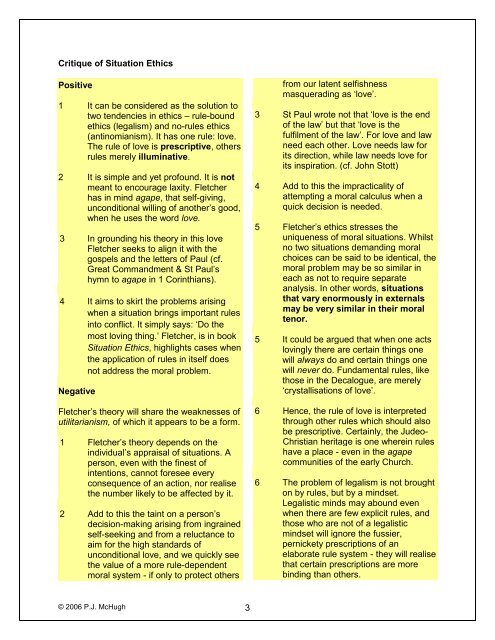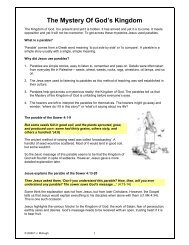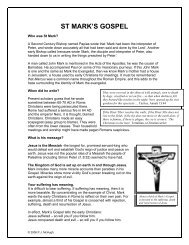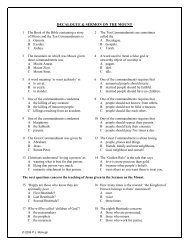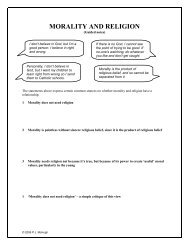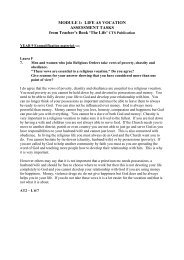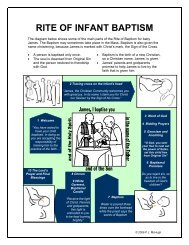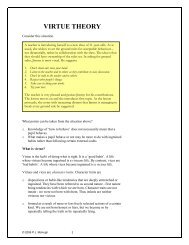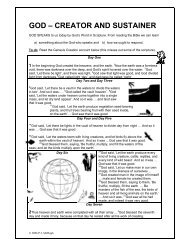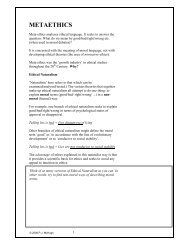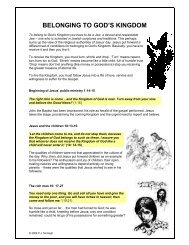Situation Ethics - TERE
Situation Ethics - TERE
Situation Ethics - TERE
Create successful ePaper yourself
Turn your PDF publications into a flip-book with our unique Google optimized e-Paper software.
Critique of <strong>Situation</strong> <strong>Ethics</strong><br />
Positive<br />
1 It can be considered as the solution to<br />
two tendencies in ethics – rule-bound<br />
ethics (legalism) and no-rules ethics<br />
(antinomianism). It has one rule: love.<br />
The rule of love is prescriptive, others<br />
rules merely illuminative.<br />
2 It is simple and yet profound. It is not<br />
meant to encourage laxity. Fletcher<br />
has in mind agape, that self-giving,<br />
unconditional willing of another’s good,<br />
when he uses the word love.<br />
3 In grounding his theory in this love<br />
Fletcher seeks to align it with the<br />
gospels and the letters of Paul (cf.<br />
Great Commandment & St Paul’s<br />
hymn to agape in 1 Corinthians).<br />
4 It aims to skirt the problems arising<br />
when a situation brings important rules<br />
into conflict. It simply says: ‘Do the<br />
most loving thing.’ Fletcher, is in book<br />
<strong>Situation</strong> <strong>Ethics</strong>, highlights cases when<br />
the application of rules in itself does<br />
not address the moral problem.<br />
Negative<br />
Fletcher’s theory will share the weaknesses of<br />
utilitarianism, of which it appears to be a form.<br />
1 Fletcher’s theory depends on the<br />
individual’s appraisal of situations. A<br />
person, even with the finest of<br />
intentions, cannot foresee every<br />
consequence of an action, nor realise<br />
the number likely to be affected by it.<br />
2 Add to this the taint on a person’s<br />
decision-making arising from ingrained<br />
self-seeking and from a reluctance to<br />
aim for the high standards of<br />
unconditional love, and we quickly see<br />
the value of a more rule-dependent<br />
moral system - if only to protect others<br />
© 2006 P.J. McHugh 3<br />
from our latent selfishness<br />
masquerading as ‘love’.<br />
3 St Paul wrote not that ‘love is the end<br />
of the law’ but that ‘love is the<br />
fulfilment of the law’. For love and law<br />
need each other. Love needs law for<br />
its direction, while law needs love for<br />
its inspiration. (cf. John Stott)<br />
4 Add to this the impracticality of<br />
attempting a moral calculus when a<br />
quick decision is needed.<br />
5 Fletcher’s ethics stresses the<br />
uniqueness of moral situations. Whilst<br />
no two situations demanding moral<br />
choices can be said to be identical, the<br />
moral problem may be so similar in<br />
each as not to require separate<br />
analysis. In other words, situations<br />
that vary enormously in externals<br />
may be very similar in their moral<br />
tenor.<br />
5 It could be argued that when one acts<br />
lovingly there are certain things one<br />
will always do and certain things one<br />
will never do. Fundamental rules, like<br />
those in the Decalogue, are merely<br />
‘crystallisations of love’.<br />
6 Hence, the rule of love is interpreted<br />
through other rules which should also<br />
be prescriptive. Certainly, the Judeo-<br />
Christian heritage is one wherein rules<br />
have a place - even in the agape<br />
communities of the early Church.<br />
6 The problem of legalism is not brought<br />
on by rules, but by a mindset.<br />
Legalistic minds may abound even<br />
when there are few explicit rules, and<br />
those who are not of a legalistic<br />
mindset will ignore the fussier,<br />
pernickety prescriptions of an<br />
elaborate rule system - they will realise<br />
that certain prescriptions are more<br />
binding than others.


